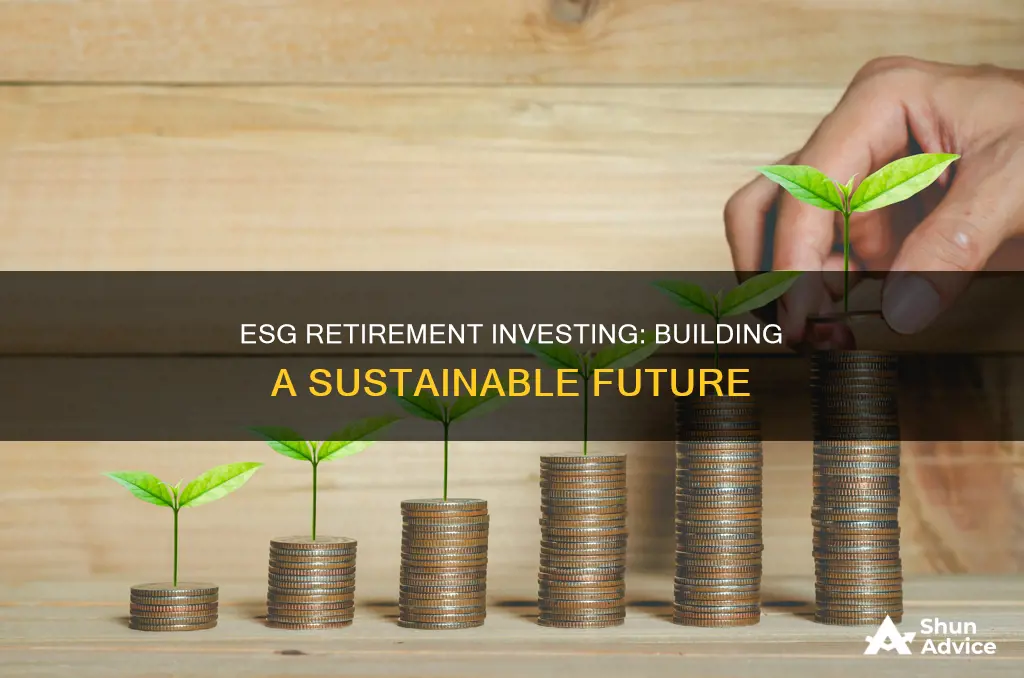
Environmental, Social, and Governance (ESG) investing is a strategy that considers non-financial factors when making investment decisions. This can include banning investments in companies that produce guns or fossil fuels, for example. In November 2022, the Biden administration passed a rule allowing retirement plan investors to take these factors into account. This was a reversal of the previous Trump administration's rule, which stated that money managers could only make investments based on financial considerations. The new rule allows retirement plan investors to consider ESG factors when selecting investment options and exercising shareholder rights, such as proxy voting for plan-held securities.
| Characteristics | Values |
|---|---|
| Definition | ESG stands for Environmental, Social, and Governance factors. |
| Objective | To allow retirement plan investors to consider ESG factors when making investment decisions. |
| Regulation | The U.S. Department of Labor issued a rule in November 2022 to allow ESG factors to be considered in retirement plan investments. |
| Applicability | The rule applies to retirement plan decision-makers, called fiduciaries, who manage 401(k) plans and other retirement investments. |
| Considerations | Fiduciaries must prioritize the financial interests of plan participants and cannot sacrifice potential gains solely for ESG goals. |
| Support | The rule has support from Democratic leaders, investors, and younger generations who prioritize ESG factors. |
| Criticism | Critics, including Republicans and fossil fuel-linked companies, argue that ESG investing could harm profits and is not always managed with ESG goals in mind. |
| Impact | The rule may create new opportunities for large money managers to offer ESG-conscious investment options. |
What You'll Learn

ESG investing screens investments based on socially conscious factors
Environmental, social, and governance (ESG) investing is used to screen investments based on corporate policies and to encourage companies to act responsibly. ESG criteria consider a company's environmental, social, and governance performance.
The environmental criteria gauge how a company safeguards the environment, including its climate policies, energy use, waste, pollution, natural resource conservation, and treatment of animals. The social criteria examine how a company manages relationships with employees, suppliers, customers, and communities. This includes a company's treatment of its employees, its impact on the local community, and its workplace conditions. The governance criteria ensure a company uses accurate and transparent accounting methods, pursues integrity and diversity in its leadership, and is accountable to shareholders.
ESG investing can help portfolios avoid holding companies engaged in risky or unethical practices. It can also encourage companies to act responsibly and drive real change for the common good. Many brokerage firms offer investment products that employ ESG principles, and ESG-specific mutual funds and ETFs reached a record $480 billion AUM in 2023.
ESG investing is sometimes referred to as sustainable investing, responsible investing, impact investing, or socially responsible investing (SRI). SRI investors seek companies that promote ethical and socially conscious themes, including diversity, inclusion, community focus, social justice, corporate ethics, and opposition to discrimination.
While ESG investing considers a broad range of behaviours and policies, SRI focuses on a company's broader social impact. SRI allows investors to conduct positive and negative screens to invest in companies they believe are engaging in sustainable practices such as environmental stewardship, consumer protection, human rights, and diversity. SRI emphasizes financial returns as a secondary consideration after the investors' moral values.
ESG investing offers a pragmatic approach to addressing financially material issues through a broader information set. It provides a framework for looking at social impact beyond simply excluding companies associated with negative outcomes. By considering ESG factors, investors can make informed choices that align with their values and support companies that are acting responsibly.
Investments: What's Cheap Now?
You may want to see also

ESG investing considers non-financial factors in investment decisions
Environmental, social, and governance (ESG) investing is a way to build a more ethical portfolio. It is a form of sustainable investing that considers non-financial factors such as environmental, social, and governance criteria to evaluate a company or investment's sustainability.
ESG investing is used to screen investments based on corporate policies and to encourage companies to act responsibly. It helps investors ensure that the companies they fund are responsible stewards of the environment, good corporate citizens, and led by accountable managers.
The environmental criteria gauge how a company safeguards the environment, including its climate policies, energy use, waste, pollution, natural resource conservation, and treatment of animals. The social criteria examine how a company manages relationships with employees, suppliers, customers, and communities, including workplace conditions, employee health and safety, community involvement, and data protection and privacy. The governance criteria ensure a company uses accurate and transparent accounting methods, pursues integrity and diversity in leadership, and is accountable to shareholders.
ESG investing can help portfolios avoid holding companies engaged in risky or unethical practices. It provides a framework for companies to evaluate their sustainability and for investors to make informed choices.
Retirement Account: Investing Beyond $5500
You may want to see also

ESG factors can positively impact a company's profitability
ESG (Environmental, Social, and Governance) investing is a strategy that considers non-financial factors when making investment decisions. This includes social accountability, which can involve excluding investments in gun and fossil fuel companies. While this type of investing has gained traction on Wall Street, with companies aiming to improve their social and environmental efforts, it has also faced criticism, particularly from Republicans, who argue that financial institutions should not promote "woke" political agendas.
Despite the controversy, research and experience show that ESG factors can positively impact a company's profitability. Firstly, companies that treat their workers fairly, are mindful of their environmental impact, and promote diversity and inclusion in their executive teams tend to be more profitable than their competitors. This suggests that ESG factors are relevant to financial returns and should be considered when making investment decisions for retirement plans.
Furthermore, companies that integrate ESG efforts into their business models can build sustainable and resilient operations. To achieve this, firms should identify material ESG issues, factor in ESG effects when making strategic and operational decisions, collaborate with stakeholders, redesign organizational roles, and communicate their approach to investors. While many companies are yet to make significant progress in delivering on their ESG commitments, integrating these factors into their core strategies can lead to improved financial performance.
Additionally, there is a growing surge in investor interest in companies with high ESG performance or those taking ESG goals seriously. This indicates that incorporating ESG factors can enhance a company's reputation and attract a wider range of investors. As a result, companies that prioritize ESG may benefit from increased investment and improved profitability.
Overall, ESG factors can positively impact a company's profitability by improving operational efficiency, reducing risks, and attracting a broader investor base. By considering these factors, companies can build sustainable businesses that are more resilient to environmental, social, and governance-related challenges, ultimately leading to improved financial outcomes.
Pension Investment: Choosing Wisely
You may want to see also

ESG funds are not always managed with ESG goals in mind
ESG, or Environmental, Social, and Governance, investing has become a popular strategy for investors who want to support companies that act responsibly and promote sustainability. While ESG investing is meant to consider the environmental and social impact of companies, it has been criticised for not always aligning with these goals.
One criticism of ESG funds is that they are not always managed with ESG goals in mind. This means that while investors may choose an ESG fund with the intention of supporting sustainable and ethical companies, the fund managers may not always prioritise these factors in their investment decisions. In some cases, fund managers may focus on companies that have room for improvement on ESG matters, with the goal of helping them improve. However, this also means that the fund may be investing in companies that do not currently meet high ESG standards.
Additionally, different funds may have different interpretations of what constitutes an ESG investment. For example, some funds may focus more on the "governance" aspect, investing in companies with strong governance policies, while others may prioritise the "environmental" aspect, seeking out companies with policies aimed at minimising their environmental impact.
The subjectivity of ESG criteria can also lead to discrepancies in how funds are managed and marketed. There is currently no standardised rating system for ESG funds, and different providers may use varying criteria and weightings to evaluate companies. This can make it challenging for investors to truly understand how their funds are being managed and whether the investments align with their values and goals.
Furthermore, the popularity of ESG investing has led to concerns about "greenwashing", where funds may exaggerate or overstate their environmental and sustainability practices to attract investors. This can make it difficult for investors to distinguish between funds that are genuinely committed to ESG principles and those that are simply paying lip service to the idea.
It is important for investors to carefully research and understand the specific strategies and criteria used by ESG funds before investing. By reviewing a fund's disclosure documents, prospectus, and shareholder reports, investors can gain a clearer picture of how the fund incorporates ESG factors and whether it aligns with their values and financial goals.
In summary, while ESG investing has gained traction as a way to promote sustainable and ethical business practices, it is important to recognise that not all ESG funds are managed with a sole focus on ESG goals. Investors should conduct thorough research and compare different funds to ensure that their investments align with their values and financial objectives.
Smart Ways to Invest $100,000
You may want to see also

ESG investing is still rare in 401(k) plans
However, research shows that ESG factors, especially the economic consequences of climate change, can benefit retirement portfolios by mitigating long-term risks. Companies that are not reliant on fossil fuels, for example, are positioned to perform better in the future and are thus superior long-term investments.
Another reason for the rarity of ESG funds in 401(k) plans is the Trump administration's stance on the matter. While it didn't ban workplace retirement providers from offering ESG funds, it did institute a rule requiring 401(k) plans and pension funds to make investment decisions based solely on "pecuniary," or economic, factors. This made providers hesitant to incorporate ESG into their evaluations.
The Biden administration has been walking back these restrictions, and in November 2022, the Department of Labor passed a rule allowing for environmental, social, and governance investing in retirement plans. This rule was later overturned by the House of Representatives in February 2023, with the resolution advancing to the Senate, which has a slim Democratic majority.
Despite these challenges, ESG investing has become more popular, with investors pouring $69.2 billion into them in 2021, an annual record. This trend is expected to continue, with ESG assets projected to eclipse $33 trillion by 2026.
Networking: Your Secret Weapon for Success
You may want to see also
Frequently asked questions
ESG stands for environmental, social, and governance factors. It is a type of investing that considers non-financial factors such as social accountability and the potential impact on the environment.
ESG investing screens investments based on socially conscious factors. This can include banning investments in gun and fossil fuel companies.
ESG investing allows people to do well financially while also doing good in the world. It can also help to mitigate financial risks caused by climate change.
Critics of ESG investing argue that it could harm the fossil fuel industry and that the consideration of additional factors may come at the expense of profits.
ESG investing is becoming more popular, especially among younger investors. According to Vanguard, only 13% of its 401(k) plans currently offer ESG funds, but new regulations could create more opportunities for large money managers to market ESG-conscious investment options.







